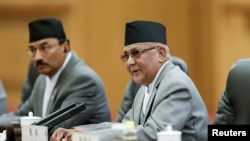Nepal's Prime Minister refused to resign on Tuesday after the main Maoist party that had supported his coalition said it would try to form a new government, throwing the impoverished Himalayan country into renewed political uncertainty.
K.P. Oli, who came to power in October when the Maoists offered his party parliamentary backing to build a coalition, faces the prospect of a no-confidence vote if he cannot persuade other partners to stick with him.
"There is no need for the prime minister to resign. If there is a no-confidence vote against him in the parliament the prime minister will face it," Oli's press adviser Pramod Dahal told Reuters after meeting junior coalition partners.
Neighbours India and China compete for influence in Nepal and are both likely to be concerned by the prospect of more instability.
Oli survived an earlier attempt by the Maoists to unseat him in May after he reached a power-sharing deal.
The Maoists - who ended a decade-long insurgency in 2006 before joining mainstream politics - said on Tuesday that Oli and his communist UML party had broken promises made in May.
They also accuse him of failing to resolve anger in the south of the country over the terms of a new constitution, and of failing to speed up rebuilding of homes and roads destroyed in an earthquake last year.
"We believe that our decision to withdraw support to this government will help form a new alliance on the basis of national consensus among major political parties," Krishna Bahadur Mahara, a top Maoist official, told reporters in Kathmandu.
Mahara said the opposition Nepali Congress party was ready to throw its support behind Maoist leader Prachanda to form a new government. If that were to happen, Oli's fate would depend on the support of a number of smaller parties.
Congress party officials were not immediately available for comment.
Commentator Lok Raj Baral said the move by the Maoists, traditionally a rural party, could force a no-confidence vote and end Oli's term in office.
"I suspect these two parties have already made a deal, but we will need to wait and see how Oli and the UML respond," he said, referring to the Maoists and the Congress.
Oli is Nepal's seventh prime minister since its 239-year old monarchy was abolished in 2008 and a new constitution adopted in September.
The passing of the constitution looked like a rare moment of political consensus among the main political parties, but protests soon followed.
Minority Madhesis, who live mostly in Nepal's lowlands near India, imposed a four-month border blockade to protest against a proposal to carve Nepal into seven federal states, which they say would divide their homeland and deprive them of a fair say.
More than 50 people were killed in clashes before protesters called off the blockade in February.





